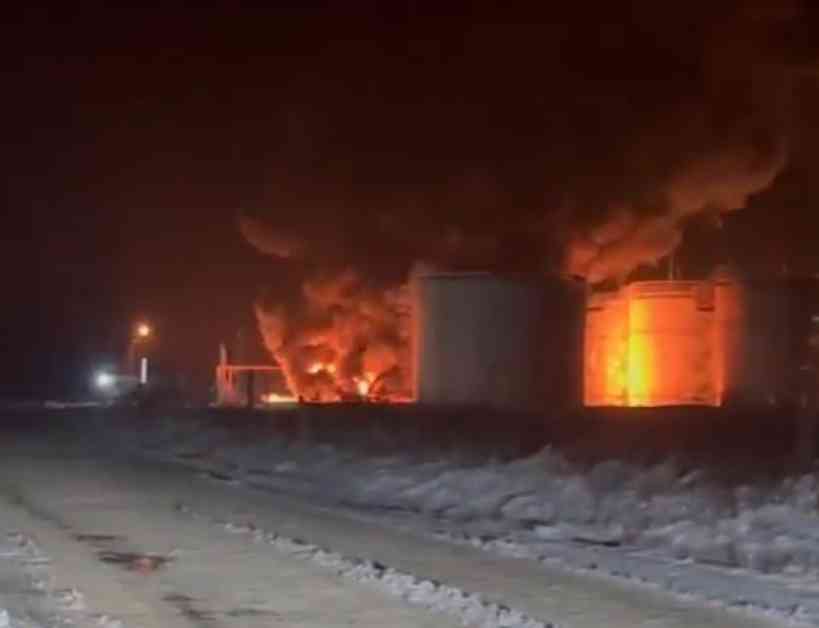A drone attack on a Russian oil depot near the Ukrainian front lines has raised concerns about escalating tensions in the region. The incident, which occurred in Novominskaya, Krasnodar Krai, resulted in a fire at the Albashnet LLC facility, approximately 250 kilometers from the conflict zone. The strike, believed to be carried out by a missile-drone developed by Ukraine, highlights the country’s growing capability to target strategic Russian infrastructure from extended ranges.
Details of the Attack
The attack on the oil depot in Novominsk sparked a second-degree complexity fire, requiring a significant firefighting effort involving 55 personnel and 19 pieces of equipment. Governor Veniamin Kondratiev of Krasnodar Krai confirmed the incident, attributing the damage to drone debris falling on a petroleum tank. Despite Kondratiev’s assertion that Kyiv authorities were behind the attack, the Russian Ministry of Defense only acknowledged intercepting drones in other regions, without mentioning any activity in Krasnodar Krai.
NASA’s FIRMS monitoring system detected a thermal event at the facility in Novominsk at 1:11 AM local time, confirming the outbreak of the fire. The oil depot, which houses eight storage tanks, experienced significant damage, with three large and five medium-sized tanks being impacted by the attack. This incident marks a significant escalation in the use of drones by Ukraine to target key Russian infrastructure.
Impact of Ukrainian Drone Operations
In recent weeks, Ukraine has intensified its drone operations against Russian targets, achieving notable successes in disrupting the country’s fuel production capacity. Ukrainian drones have targeted key energy facilities in southern Russia, including a major Lukoil oil refinery in Volgograd and a gas processing plant in Astrakhan, leading to operational disruptions and substantial fires. These attacks have not only caused material damage but have also resulted in temporary flight suspensions across various regions.
The Ukrainian military’s 14th UAV Regiment has been instrumental in these operations, using coordinated drone swarms to overwhelm Russian air defenses and effectively target critical infrastructure. The increased frequency and effectiveness of these drone strikes have prompted Russia to reassess its defensive strategies and highlighted the evolving dynamics of modern warfare. As Ukraine continues to enhance its domestic drone production, supplying the majority of its UAV needs, the country is poised to deploy 30,000 long-range drone units in 2025, significantly bolstering its operational capabilities.
The strategic deployment of drones by Ukraine has not only disrupted Russian supply lines and logistics but has also posed a significant challenge to Russia’s fuel output. With key refineries targeted and operational disruptions occurring, Russia is facing a growing threat to its energy security. The success of Ukrainian drone operations underscores the importance of technological advancements in modern warfare and the impact of asymmetrical tactics on traditional defense strategies.
In conclusion, the drone attack on the Russian oil depot near the Ukrainian front lines signifies a new phase in the ongoing conflict between the two countries. As Ukraine continues to leverage drone technology to target critical Russian infrastructure, the geopolitical landscape in the region is evolving rapidly. The effectiveness of these drone strikes raises questions about Russia’s defensive capabilities and underscores the need for innovative responses to emerging threats.

















